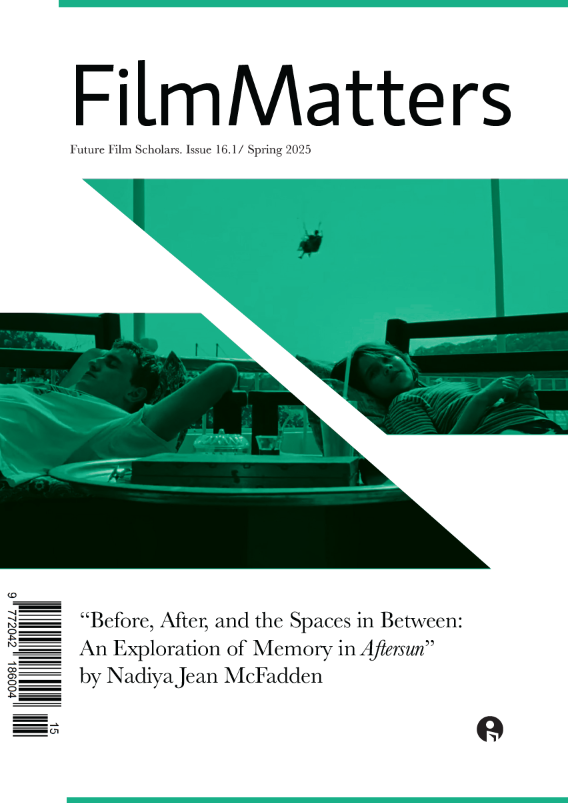Film Matters: Please tell us about your article that is being published in Film Matters.
Lydia Fraser: My article, “Exploring Elusive Identities in Wong Kar-wai’s Happy Together,” is a piece that analyzes Happy Together (1997) as an intersectional film that reveals the unique and complex interactions between being from Hong Kong and being queer.
FM: What research and/or methodologies do you incorporate in your article?
LF: I typically try to find ways opposing arguments can be positioned against my own and attempt to address them preemptively in my article to strengthen my thesis.
FM: Describe the original context for/when writing this article while an undergraduate student.
LF: I originally wrote this for an undergraduate film course that presented a general overview of significant cinematic movements, including Nouvelle Vague, Italian Neorealism, Third Cinema, etc., and challenged the ways we often regard cinema, particularly from the perspective of Hollywood. For our final project, we were instructed to organize a film festival, and my group decided to curate one centering queer cinema and the different ways queer people navigate space. One of the films we included was Wong Kar-wai’s Happy Together, so when it came time to write our individual final papers, it was a no-brainer for me. His cinematography has always fascinated me, and I was especially interested in exploring non-Western queer stories. It definitely also helped that I love Tony Leung and Leslie Cheung!
FM: What does your writing process look like?
LF: I start with all of the literature and readings I have collected and create a blank document. I then go through each source, one by one, and write down every sentence and paragraph that I believe would contribute to my analysis. I do the same with my selected film(s) and there is often a through line and commonality between all of my sources that will compose my thesis. Then I finally begin to consider my paper’s structure.
FM: How have your personal experiences shaped and influenced your writing?
LF: I usually gravitate toward media I feel some sort of personal connection to, so, especially in writing about film, those are often also the types of media I enjoy studying more in depth. It seems that shouldn’t be the case, when I’m writing academically, but I think that connection is what truly allows me to become fully engaged in my own writing. As an aspiring scholar, I am also interested in the potential for academia to offer platforms for understudied identities and stories, which is another reason I think holding a personal stake in at least the subject of which you are writing about is important.
FM: What are your methods for finding diverse and relevant sources?
LF: I’m often inspired by a lot of the readings offered through my course as well as my own topical searches through the Harvard Library, Google Scholar, and other academic search engines.
FM: Why is including marginalized voices in research important to you?
LF: Research has a lot of influence on decisions that impact our everyday lives, the way we interact with and perceive others, even for people considered to be more removed from the world of academia.
FM: What aspects of the writing process were most challenging? Why?
LF: I think selecting the scenes I wanted to write about was one of the more challenging steps of writing because there was so much I would have liked to continue discussing that I did not have room for.
FM: What’s a resistance point you hit in your writing, and how did you move past it?
LF: I usually overwrite and experience a bit of trouble trying to cut down my words, so I really have to read my article a million times to consider whether certain points are necessary or repetitive.
FM: What do you enjoy most about your article?
LF: My favorite part about academic writing is watching my argument slowly come together. The initial part of research and source collection is painful, but I love reaching the stage where my paper is essentially writing itself.
FM: How has the Film Matters editorial and publication process impacted the development/evolution of your article?
LF: It has really helped me better understand my writing from a third-person perspective. All of the feedback I got was also really helpful to consider not just for this article but future potential publications as well.
FM: What audience do you hope to reach with your Film Matters article and/or what impact do you hope it has on the field of film studies?
LF: My biggest desire for any of my work is to tell and highlight undersold stories.
FM: How has your department and/or institution supported your work in film and media?
LF: The Art, Film and Visual Studies Department at Harvard has been very encouraging about all different pursuits in the world of visual culture. The courses they offer, especially in film, and their professors are ingenious.
FM: How has your faculty mentor(s) fostered your advancement as a film scholar?
LF: The professor of the course I wrote this paper for, who will also be my senior thesis advisor, and my teaching fellow for the course, offered amazing guidance not only during the course but also throughout my time at Harvard.
FM: What advice do you have for undergraduate film and media scholars?
LF: Be curious and adventurous with the film you watch and the literature you read!
FM: What are your future plans?
LF: I hope to keep studying film in graduate school!
Author Biography
Lydia Fraser (洪叶) is an undergraduate at Harvard College pursuing a double concentration in government and film & visual studies, with an interest in film theory and history, along with a language citation in French.








































